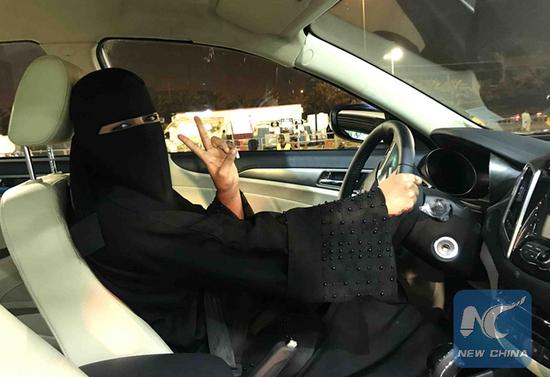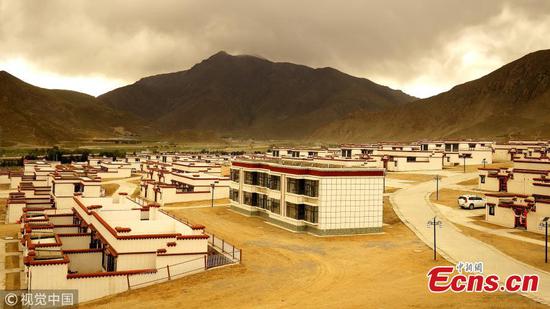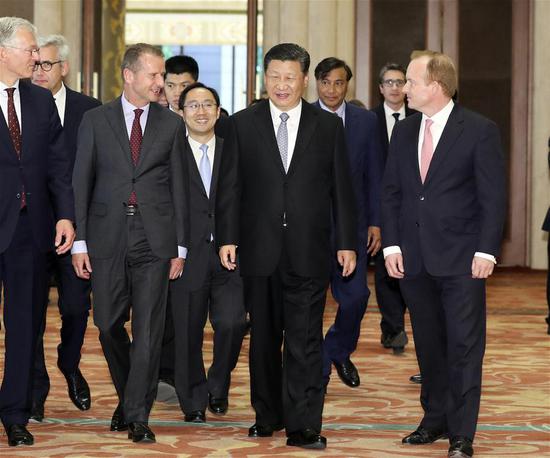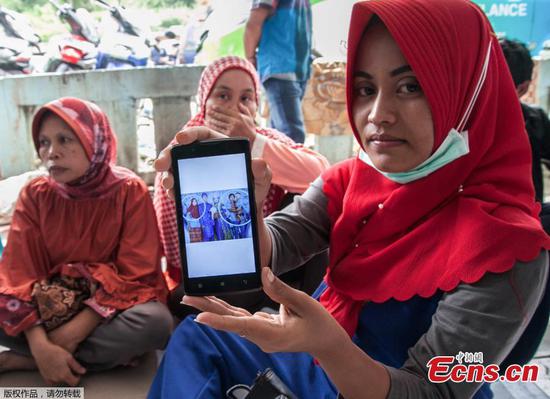
A Saudi Arabian woman is driving on the road in capital Riyadh on June 24, 2018. (Xinhua/Wang Bo)
Wearing a black robe and veil, Hanan Azmi drove her black Cadillac for the first time along the Tahalia Street in the Saudi Arabian capital Riyadh.
Her father, sitting next to her, was giving advices about her driving from time to time.
It is the first day that Saudi women are legally able to drive in this rigid kingdom.
Azmi was not among the first women who hit the road on the remarkable day.
Just as the clock ticked past midnight, scores of women in the coastal cities of Jeddah and Khobar could not wait to take their cars to the roads.
Women were driving their cars of various brands, slowly, accompanied by their families, amid tight security measures and dozens of news cameras.
Saudi traffic authorities have renewed the messages on electronic billboards to take into account female drivers, reading "sister drivers, brother drivers: the General Department of Traffic wishes you a safe trip on the road."
Despite many inexperienced women drivers on the roads, the traffic on the day across the country has remained smooth and calm, according to a statement of Saudi General Department of Traffic.
The decision to allow women to drive are widespread supported within Saudi Arabia.
Prince Al-waleed bin Talal, renowned businessman and a member of Saudi royal family, lauded it as one of the "greatest decisions" in the country's history in a video posted on social media.
In the video, the billionaire's daughter, Princess Reem Bint Al Waleed was seen driving a car. "It is the first time that I am able to drive on the streets of Saudi Arabia," the princess told her daughter in the footage.
Some companies, supportive of women driving, have opened up parking space specifically for women.
"I can now drive myself to work, and no longer need to hire a chauffeur, which will save a large amount of expense," said Azmi excitedly. "Also, my mom and I don't have to ask my dad or brothers to drive for us when going out."
Saudi families hire 1.38 million foreign chauffeurs every year, at a cost of around 25 billion riyals (6.6 billion U.S. dollars), according to Saudi statistics authorities.
"Allowing women to drive will promote gender equality and social justice, and encourages them to be more independent," said Mohammed al-Kahtani, politics professor at the King Saud University, adding that it will boost employment and economic development in the long run.
The unemployment rate of Saudi women has reached 33 percent, as a majority of them lack proper ways of transportation, Saudi official media reported.
With ban on female driving ends, a large number of job opportunities have been created for Saudi women, including policewomen and saleswomen at auto companies.
Careem, Saudi's biggest online car-booking service, also announced to recruit 100,000 women drivers.
Last September, Saudi King Salman bin Abdulaziz Al Saud declared to lift the ban on female driving from June 2018.
In line with the decree, Saudi transport authorities started to issue driving licenses to women on June 4.
Since then, newly-established female driving schools around the country have been witnessing a spike in applications, but the schools appear to be unable to meet the growing demand.
Many women have been queuing on the long waiting list of getting access to driving training courses.
In Saudi eastern provinces, only 50 women passed the exam and were granted driving licenses after 30 hours of study at driving schools, while over 8,000 others were still waiting for a chance to take the courses.
For long, women driving were forbidden in Saudi as the religious authorities claimed it was likely to lead to a number of social problems, such as harassment and interaction between men and women, a behavior deemed as unethical and immoral in the conservative country.
Saudi Crown Prince Mohammed Bin Salman, since his appointment one year ago by his father King Salman, has led a bold reform program covering society, economy and religion.
The reform was widely hailed for many of its measures that aimed to promote women's rights, such as allowing women to drive, enabling them to watch football games at stadiums and so on.


















































